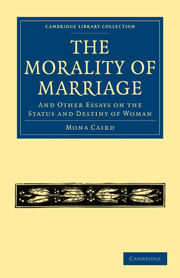Book contents
- Frontmatter
- Contents
- INTRODUCTION
- THE EMANCIPATION OF THE FAMILY
- MARRIAGE
- PART I THE PIONEER OF CIVILISATION
- PART II MARRIAGE BEFORE AND AFTER THE REFORMATION
- PART III THE LOT OF WOMAN UNDER THE RULE OF MAN
- PART IV A MORAL RENAISSANCE
- THE FUTURE OF THE HOME
- THE MORALITY OF MARRIAGE
- A DEFENCE OF THE “WILD WOMEN”
- PHASES OF HUMAN DEVELOPMENT
PART II - MARRIAGE BEFORE AND AFTER THE REFORMATION
Published online by Cambridge University Press: 16 May 2011
- Frontmatter
- Contents
- INTRODUCTION
- THE EMANCIPATION OF THE FAMILY
- MARRIAGE
- PART I THE PIONEER OF CIVILISATION
- PART II MARRIAGE BEFORE AND AFTER THE REFORMATION
- PART III THE LOT OF WOMAN UNDER THE RULE OF MAN
- PART IV A MORAL RENAISSANCE
- THE FUTURE OF THE HOME
- THE MORALITY OF MARRIAGE
- A DEFENCE OF THE “WILD WOMEN”
- PHASES OF HUMAN DEVELOPMENT
Summary
“There is no sort of vexation which among civilised peoples man cannot inflict upon woman with impunity.”
—Diderot.On the spread of Christianity and the ascetic doctrines of its later teachers, feminine influence had received a severe check. “Woman”! exclaims Tertullian with startling frankness, “thou art the gate of hell”! This is the key-note of the monastic age. Woman was an ally of Satan, striving to lead men away from the paths of righteousness. She appears to have succeeded very brilliantly! We have a century of almost universal chaos, ushering in the period of the minnesingers and the troubadours, or what is called the age of chivalry. Chaotic, however, as was this era, it brought forth some of the most beautiful conceptions of conduct which the human heart has ever created.
Perhaps it is idle to attempt to imagine what would have happened if some particular influence had been absent, at a particular historical juncture; yet it is difficult to avoid speculating as to the probable line of European development, if mediæval chivalry had not arisen to provide humanity with a set of ideals which, to this day, represent all that is generous and honourable in conduct, and all that is noble and courteous in manners. Nearly all writers agree in tracing to the romantic spirit of this institution, the development and fixing of those sentiments of reverence for weakness, and contempt for cowardly aggression, which tend to keep society healthy and possible, to this day.
- Type
- Chapter
- Information
- The Morality of MarriageAnd Other Essays on the Status and Destiny of Woman, pp. 73 - 91Publisher: Cambridge University PressPrint publication year: 2010First published in: 1897



